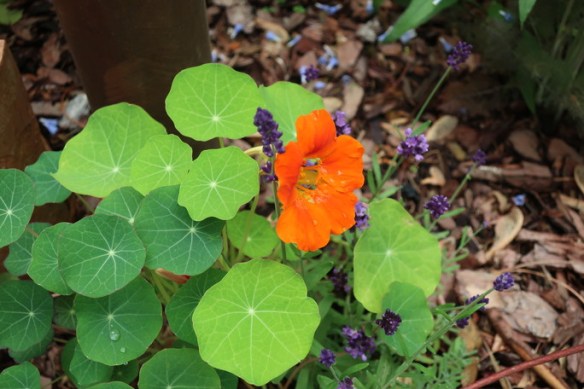Humans have always known the importance of being connected to the natural world. Not simply for the obvious – food, shelter ( caves, construction materials), fuel and, medicine. We are inherently aware that there is a deeper, spiritual relationship between us and the plant kingdom. From using flowers/plants to mark every significant event in our lives, returning our spent bodies to the embrace of the earth, to adorning and anointing ourselves with flowers, leaves, bark and roots for their perfume, cosmetic properties in a bid to enhance our looks, the horticultural world is intrinsic to our human-ness.
There is a plethora of anecdotal and scientific evidence to support the positive effect of time spent outdoors. Garden therapy is an accepted and valued method to heal all sorts of human conditions – physical and mental. Be it a stroll in the park, a hike in the woods, puttering in the garden or just sitting quietly amidst some greenery, a positive effect is palpably felt. Lifting ones mood, being physically energized after a stint out in nature is something every one of us can relate to. Gardening is empowering. To create something useful and beautiful is transforming. There is even a ‘Gardens Without Borders’ effort to help refugees in camps and war zones cope with their circumstances. That’s plant power.
Humans generally go about assuming their position at the very top of the living world. I’m not certain how we got to possess such hubris because in my experience, nothing is more humbling than observing nature closely as one does in gardening. Before one assumes what we do outsideis the principal effector, consider the plant community itself. What do we truly know about the kingdom of plants?
We have generally assessed plants from a very human perspective – how do they serve us? We regard plants as being there for our specific purposes. And we are in charge. Their very separation from us and all animals to a kingdom of their own shows how we think about plants. They are totally unlike us. But, are they really?
This past Saturday, I attended two highly interesting talks/panel discussions. Both were events made possible by the World Science Festival. The WSF takes place at this time of year in New York City – five days chock full of talks and discussions on all sorts of scientific topics. Leading scientists from different parts of the world participate in these talks and enlighten auditoriums packed with people thirsting for answers and understanding the issues currently affecting our lives. From cancer research to cosmic riddles to climate change to contemplating the cerebrum as we know it. I’ve been going to the WSF since it began about 11 years ago. I get positively giddy with excitement going through the line-up of talks and making my choices for the ones I’m most eager to attend.
This year, I chose two events that were so closely related that I believe they should’ve been proposed as a double feature. ‘Rethinking Thinking’ and ‘ Intelligence Without Brain’ were my picks. Both were so interesting and certainly enlightening. The take home is having a brain and neurons is only one way to think and navigating life. And humans are not special at all – we are just one form of life. Given my own background in molecular biology, this was not surprising or hard to accept.
It was fascinating to learn that even stuff like fungi and slime mold are capable of communication, problem solving and decision making. More so than one can imagine. In the animal kingdom, there is’ intelligence’ that parallels humans – only in ways more suited to their own genus and/or species. And when it comes to plants, they do so much more than we ever thought possible!
In recent years, we have learned that plants communicate by sending out chemical messages to warn, commiserate about disease and other life conditions. On Saturday, I found out that they make sounds via their roots! They have voices. At this time, we don’t know the how or why. It’s possible they can ‘talk’ above ground as well – we just don’t know how to test/hear them. Yet. Cogitate on that.
Going further, there is now data that plants can reason and remember. Yes, that’s right. This is all cutting edge scientific research and terribly thrilling. I won’t go into details and you don’t have to take my word for it as all the talks can be accessed at worldsciencefestival.com
So, circling back to my original commentary about how we are healed and invigorated by just being in the presence of plants. Perhaps, plants ‘silently’ comfort and/or treat our wounded selves in ways we are yet to determine or measure. They have after all been around so much longer than we humans and get this – the plant kingdom is 99% of all living forms found on earth. Surely then, it stands to reason that they know more than us. Stay tuned!
Here are some feel good images from the garden. Enjoy –














(c) 2019 Shobha Vanchiswar
[do_widget “Blog Subscriptions (Jetpack)”]
